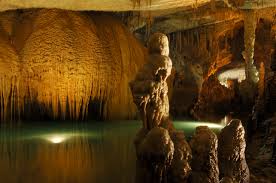Jeita Grotto, lebanon
🌌 Jeita Grotto – Lebanon’s Underground Masterpiece
📍 Location: Jeita, Keserwan District, Mount Lebanon
🗓️ Best Time to Visit: April – November
🧭 Two Magical Worlds Inside the Grotto
🔹 Upper Grotto (Walking Tour)
-
Highlights: World’s longest stalactite (8.2 meters), huge galleries, glittering formations
-
Duration: ~40-minute walk on a safe pathway
-
Vibe: Dreamlike silence, dimly lit, ideal for slow-paced exploration
-
Note: Cameras and phones are not allowed—enjoy the experience unplugged
🔹 Lower Grotto (Boat Ride)
-
Highlights: A silent boat ride across a turquoise underground river
-
Duration: 10–15 minutes
-
Vibe: Surreal and calm, like floating through a magical movie scene
-
Open in: Dry months only (April to November)
🚠 Extras & Attractions on Site
-
Cable Car Ride: Soar above pine valleys to the grotto entrance
-
Mini Train Shuttle: Scenic ride between lower and upper grotto entrances
-
Film Room: Watch a short documentary about how the grotto was discovered
-
Gardens & Sculptures: Relax and take pictures in landscaped outdoor areas
🎟️ Visitor Info
-
Opening Days: Tuesday to Sunday (Closed Mondays)
-
Hours: ~9:00 AM – 5:00 PM (may vary seasonally)
-
Ticket Includes: Both grottos, cable car, train, film screening
-
Price: ~$10 USD (for adults)
🍽️ Where to Eat Nearby
-
Le Teleferique Restaurant – Gorgeous terrace dining with mountain views
-
Al Ferdaws – Traditional Lebanese dishes in a river valley garden
-
Abou Joseph (Zouk Mosbeh) – Local favorite for quick mezze & grilled meats
🏞️ Perfect Nearby Add-ons
-
Our Lady of Lebanon – Harissa (20 min drive): Panoramic views & religious site
-
Jounieh Bay: Cafés, jet ski rentals, and sunset strolls
-
Nahr el Kalb River: Ancient inscriptions and riverside beauty
📸 Best Photo Moments
-
Jeita Grotto letter sign at the entrance
-
The cable car rising through the pines
-
Sculpted garden views over the valley
-
The outer cave entrance framed by stone and greenery
(Interior photography is not allowed – so soak it in fully while you’re there!)
🚗 Getting There
-
From Beirut: ~18 km (30–40 mins by car)
-
Parking: On-site and secure
-
Public Transit: Not direct—best to rent a car or book a guided tour
🧳 Insider Tips
-
Arrive before 11:00 AM to beat the crowds
-
Dress in layers—it's cool (16°C) inside year-round
-
Wear non-slip shoes; the paths can be slightly wet
-
Don't bring large bags—lockers are available but limited
-
Jeita is family-friendly, but not wheelchair-accessible
🌍 Did You Know?
-
The water from Jeita’s lower cave feeds Beirut’s main freshwater supply
-
It was a finalist in the global New 7 Wonders of Nature competition
-
Its name comes from Aramaic “Ge’itta” meaning “roaring water”


